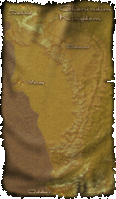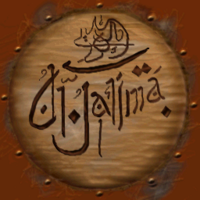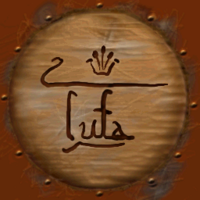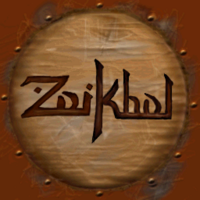Gharu'n
| |||||||||||||||||
The Naqut Desert, which divided the land of Milantos from the decaying Roulean Empire was where it was that the people known as Gharu'ndim lived.[1]
To the north, near the Ironsea, lies the City of Lore, Tirethas, originally a Roulean City[1][2] , to the south, the mountain region of Taban, with its main settlement Nishadina and the mines of the Nariyid Mountains[3].
Other settlements and cities include the port of Mawwuz[4], Qush[5] and Shiryaz[6]. Another landmark in Gharu'n might be th ruins of al-Shaghra, the City Which Rises.[5]
History
From the Naqut Desert, Rakhil al-Khur started his conquest of the Roulean Empire to the north, after slaying the demon Hayyaz. [1]
Together with Yasif ibn Salayyar, he conquered a large part of the old Roulean Empire.[7] When the raiders laid siege to Tirethas, the City of Lore, however, Rakhil made the mistake of threatening to burn the books within her walls. Yasif struck down his king in rage, and the conquest came to a sudden end.[2]
He was succeeded by his son, Amul ibn Rakhil.[4] Amul died heirless, poisoned at his own birthday celebration[2], and the former court of Amul ibn Rakhil at al-Nafalt competed fifteen years for the throne.[8]
No fewer than twenty-five Maliks ruled over the next hundred years. The al-Nafalt was razed, and dark times fell over the land. From across the sea, the conquest-hungry kingdom of Viamont sent armies to invade.[2]
The Viamontians succeeded in the Gharu'ndim nation because of instability in the succession of the Maliks.[6] They set up Zahir ibn Ma'mun as a puppet while they ruled Gharu'n from afar. One by one, Zahir murdered his rivals – all save a young lord, Jawhar al-Shamshir. In the end, Jawhar defeated the puppet king and drove the Viamonters from the shores of Gharu'n. He became the new Malik, returning his kingdom to the glory it had known in Yasif's time.[2]
Led by their queen, the Malika Qadira bint Balj, the Gharu'ndim are a proud and prosperous people. There is always the threat of war, from both Viamont and Milantos, but the desert kingdom is once again a place where the sharpness of a man's mind is far more valuable than that of his sword. [2]
The second invasion of Gharu'n under leadership of King Varicci I initially went well for the Viamontians. Within two years, after a siege by sea and by land, they took Tirethas. The Viamontians marched to the northern edge of the Naqut Desert, driving the Gharu'n armies before them. The Gharu'n resistance solidified around the city of Shiryaz and fought to a standstill. One morning, the guards of the northern wall looked out over the battle plain and found that the Viamontians were gone. The great army that had camped there the previous evening had vanished in the night, leaving behind only their refuse and the tracks of thousands of boots, streaming north. A crisis at home compelled the recall of the Viamontian army. [6]
Royalty and Rulers
| Name | Bloodline | Rank/Title | Years of reign |
|---|---|---|---|
| Rakhil al-Khur[2] | Unknown | Malik | ?? RC - 977 RC |
| Amul ibn Rakhil[2] [4] | Son of Rakhil | Malik | 977 RC - 1003 RC |
| (100 years of chaos with 25 Maliks from 1003 RC - 1103 RC) | |||
| Tu'azar ibn Amul[4] | Son of Amul?? | Malik | somewhere before 1019 RC?? (death of his Vizier Mansur al-Rajan |
| Ladriya bint Daum [3] | Unknown | Malika | 1018 RC - ?? RC |
| Taraj al-Saum[9] | Unknown | Malik | ?? RC - ?? RC |
| Zahir ibn Ma'mun[2] | Unknown | Malik | somewhere before 1103 RC?? |
| Jawhar al-Shamshir[2] | Unknown | Malik | 1103 RC ?? - ?? RC |
| Qadira bint Balj[2] | Unknown | Malika | ?? RC - ?? RC |
In Dereth
When they first came to Dereth Island, the Gharu'ndim found it already occupied by the Aluvians, another people from their world. There was little conflict, however, for the Gharu'ndim were glad to live in the island's badlands and deserts. They have maintained peaceful relations with the Aluvians, as well as island's newest occupants, the Sho. As they try to find their place in this strange new land, the Gharu'ndim look to the proverbs of Yasif ibn Salayyar for guidance. [2]
Culture
Desert-dwellers who favor knowledge and trade over war and bloodshed, the Gharu'ndim are an eminently honorable, formal culture, but they also have a reputation for being somewhat distant and proud. Preferring to talk before fighting whenever possible, they speak with great politeness and formality, peppering their speech with honorifics and references to their national hero, the poet Yasif ibn Salayyar.[10]
Religions and Beliefs
The Gharu'ndim believed in the existence of demons. Two named demons in Gharu'ndim lore are al-Shajar[3] and Hayyaz[1]. Al-Shajar is described as "storm-demon in the old stories".[3]
The Gharu'ndim practiced astrology.[3]
The Crimson Stars, a group of five remarkable stars in the Southern Hemisphere, visible all year in Gharu'n, play an important role in the belief and the history of Gharu'n. The names of the stars of the cluster are: al-Shajar, al-Khur, Mahwan, Yujazik, and Sulmada. These names are ancient, but for that of al-Khur, which shines the brightest blood-red of them all. This star, once called al-Ghul, was renamed in honor of Rakhil al-Khur. There are many strange tales told of the Crimson Stars. Some say that they speak to nomads in the desert, others that they guide the destinies of the mighty. Under the clear skies of the Naqut, more than one weary traveler has claimed to see them pulse or wander the sky, or felt that the five vermilion orbs were staring oppressively down upon them.[3]
Mahwan is the citadel of the old Gharu'ndim gods upon the flaming mountain of Yujazik.[3]
Sulmada is the old Gharu'ndim god of dance.[3]
Customs and Traditions
In winter, the howling storm-winds called the Djinaya begin to gust across the Naqut Desert. The Djinaya bring with them a period the Gharun'dim call the Dusk, for the flying sand catches the light of the sun, and filters it into a dim and ruddy memory of itself. Only the boldest and most skilled mages venture out into the disorienting, blinding sandstorms. To aid travelers, the Gharun'dim erect oil lamps along their streets and near the gates of their towns. These burn with a bright, clear blue light that can be seen through the harshest weather. The Gharun'dim celebrate the Night Feast at this time, offering shelter and hospitality to any brave enough to go visiting. During the day, men and women shut in by the storms spend their time in prayer and reflection -- prayer for fortune in the coming year, and reflection on the failings and triumphs of the preceding one. As the poet says, wisdom can be found only in quiet places. Each evening, however, the entire populations of Gharun'dim towns dress in their finest garments and gather in the marketplace. Food and drink are shared, and the most accomplished storytellers stand before the assembled host, telling wild tales of magic, whimsy, and romance for the amusement of the feasters.
Those traveling in the Gharun'dim lands during the Dusk will be warmly welcomed in any home, and invited to share a cup of palm wine and a tale. For the Gharun'dim, Night Feast is a time for storytelling and contemplation. [11]
Texts
Town Network Signs
Internet Articles
- Zogblaster Archive/Heritage Groups/Gharu'ndim
- Zogblaster Archive/Heritage Groups/Gharu'ndim/Gharu'ndim Factions
- Zogblaster Archive/Heritage Groups/Gharu'ndim/Lashanda's Hand
- Zogblaster Archive/Heritage Groups/Gharu'ndim/A Poet Vanishes (To Be a Shadow)
- AC:DM CD Lore - Gharu'ndim Heritage
- Character Creation - Racial Lore: Gharu'ndim
- Character Creation - Naming: Gharu'ndim
Factions
- Jaladhaqa Qalathina, the Jaladh - The Warriors' Brotherhood
- Khuraqa Tha'ratali, the al-Khuraqa - Children of the Eagle
- Ighazaqa Talina, the al-Ighaz - Academy of Sorcery
- Walim - The Searchers
- al-Sadharamad - The Way of Stealth
- Shagar Zharala, the Zharalim - The Order of Assassins
Items
| Silifi of Crimson Stars | Shadow's Garb | Veil of Darkness | Shroud of Night | |||||
| The Poet's Mask | Mask of the Malik | Ibriya's Choice | Wings of Rakhil | |||||
| Star of Gharu'n |
Art & Images
References
- ↑ 1.0 1.1 1.2 1.3 1999/11 Release - The Hundred Trackless Paths
- ↑ 2.00 2.01 2.02 2.03 2.04 2.05 2.06 2.07 2.08 2.09 2.10 2.11 19991/11 Release - Zogblaster Archive/Heritage Groups/Gharu'ndim Cite error: Invalid
<ref>tag; name "ZogblasterGharu" defined multiple times with different content - ↑ 3.0 3.1 3.2 3.3 3.4 3.5 3.6 3.7 2000/04 Thorns of the Hopeslayer - The Silifi of the Crimson Stars
- ↑ 4.0 4.1 4.2 4.3 1999/11 Release - To Be A Shadow
- ↑ 5.0 5.1 1999/11 Release - Lashanda's Hand
- ↑ 6.0 6.1 6.2 The Origins and Current Disposition of Viamont
- ↑ 2005/07 Throne of Destiny - Wings of Rakhil Description
- ↑ 2000/04 Thorns of the Hopeslayer - The Silifi of the Crimson Stars
- ↑ 1999/11 Release - Zogblaster Archive/Heritage Groups/Gharu'ndim/Lashanda's Hand
- ↑ 2010/06 Shifting Gears - Gharu'ndim (Town Network Sign)
- ↑ Winter Festivals from Ispar










































